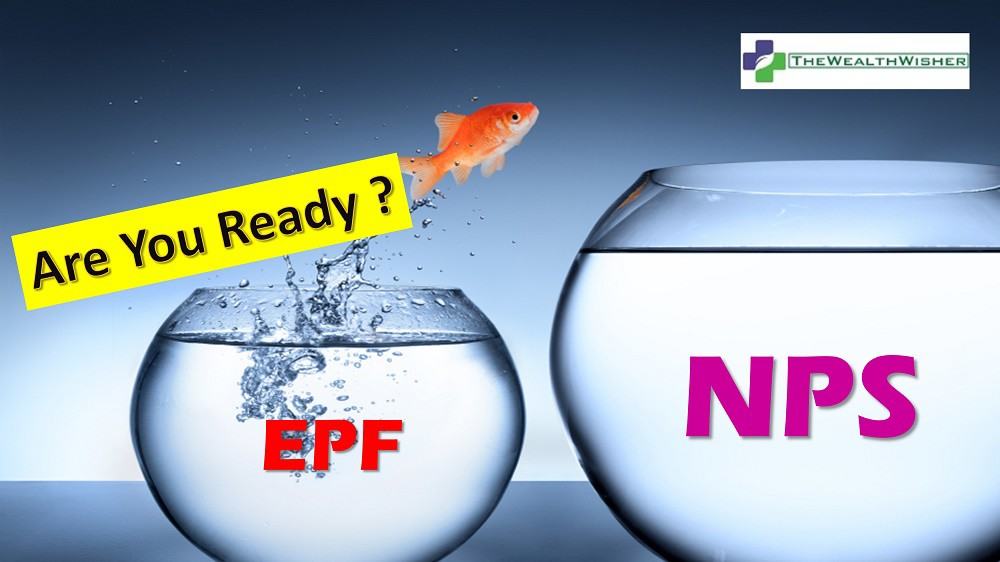In the budget of 2015-16, the government had announced that they will allow funds to be transferred from Employee Provident Fund EPF to NPS or National Pension Scheme. Finally, this has arrived, now you can Transfer EPF TO NPS. This is like one-way portability between two different superannuation schemes. And finally this last Monday, 06 March 2017, Government not only announced the guideline for transfer of PF to NPS but also they clarified that the amount transfer will be tax-free. This is a major relief. Let’s see how.
In a circular, PFRDA said, “The amount so transferred from Transfer EPF TO NPS is not treated as income for the current year and hence not taxable.”
Here is the 2 page circular for you
 |
 |
The major difference between NPS & EPF/PF
The most important difference between the NPS and PF is that NPS is a Unit Linked or market dependent returns oriented and in EPF/PF the returns are assured although monitored, controlled & changed by the Ministry of Labour.
So, NPS works just like a Mutual Fund whether you choose Equity, Corporate Bond or Government Securities option. The returns are a function of the NAV that is declared by the Pension Fund Managers who are managing the fund.
PF rate is currently 8.8% with a proposal to bring it down to 8.65% this year. Employee Pension Fund Organisation maintains the fund and if it is not able to generate the returns as announced the government subsidizes the balance.
So what is the benefit of this Transfer of EPF TO NPS
Government departments (except Defence) since 2014 are giving NPS as the retirement benefit instead of EPF as the government in longer run wants to curtail the subsidy. They want to shift everyone to NPS. So now employees who have joined prior to 2014, can shift their balances to NPS and this transaction will be tax-free.
The funds will not come in hands of the subscriber as the transfer is directly from EPFO to NPS.
Second, the benefit is for private job subscribers, for whom the employer is not providing NPS deduction. Now they can also transfer the amount to NPS, taxfree.
Also, private service people suffer tax if they withdraw their PF before 5 years. Now they have one more option where they can shift the balance to NPS during a job change.
What are the things to look out before transferring PF or EPF to NPS
The subscriber who is making a transfer should already have the NPS-Tier1 account opened. You cannot use proceeds/balance to open a new account. It should exist before applying for transfer.
The transfer for non-salaried will be made through the POS (point of sales, where NPS is opened) or in the case of employees by their concerned payroll department.
The transferred amount to the NPS will not be taken as a contribution to NPS so no income tax benefit for that year will be provided. For eg, you applied for a transfer and a balance of 5 lakhs is transferred to NPS. You cannot claim this 5 Lakhs or any amount from this under Sec 80C or Sec 80CCD(2) as a contribution.
This is one-way portability. So you have no option to transfer amount from NPS to PF or again shift the transferred balance back.
Should you Transfer EPF TO NPS
Well, as said the PF is a debt product hence falls under your debt portfolio. Out of 3 funds, NPS has 2 funds which are pure debt funds. Government employees have just one choice of a balanced fund. Transfer is a change in your asset allocation. Are you ready to take on some equity exposure? It really depends on your Risk-Tolerance.
NPS has some flexibility especially in the Auto-Life Cycle option, where equity portion minimizes on every birthday and goes zero at the time of retirement. Also features like opening Tier 2 account, commuting 60% at during withdrawal, switching the fund managers are good options as they offer choices to the investor. These are not available with EPF.
But, NPS withdrawals are still taxable. Although it has the option to commute 60% but it is taxable which is not in the case of EPF.
Also in the case of EPF, you can withdraw the amount after 2 months of leaving service. NPS has no such facility.
EPF is also coming with a housing payment scheme where you can pay your house purchase through EPF. NPS has not such facility.
So there are pros and cons. The investor needs to see what works best for him.
The NPS performance
As mentioned NPS has 3 funds Equity, Corporate Bonds & Government Securities. The individual fund managers manage these 8 funds. The performance is what makes NPS look good. This is market driven hence it will be good when we have a bull run (equity & debt) for few years. I will not say much and let the pictures do the talking:
Equity Fund Performance as on Date 03 Mar 2017 for NPS

Corporate Bond Fund Performance as on Date 03 Mar 2017 for NPS

Government Debt Fund Performance as on Date 03 Mar 2017 for NPS

So, it’s a great move, but individual situations will determine your choice to transfer your EPF to NPS or not.
Share your views and do forward this article to your friend.










